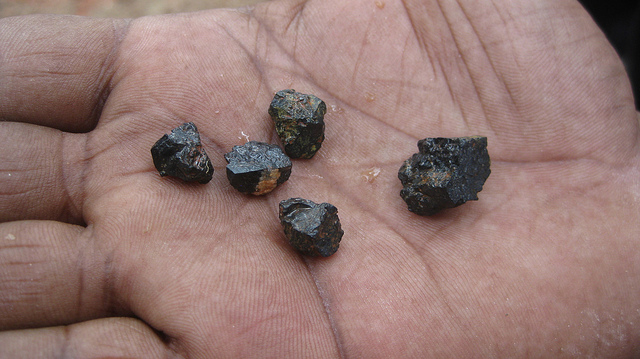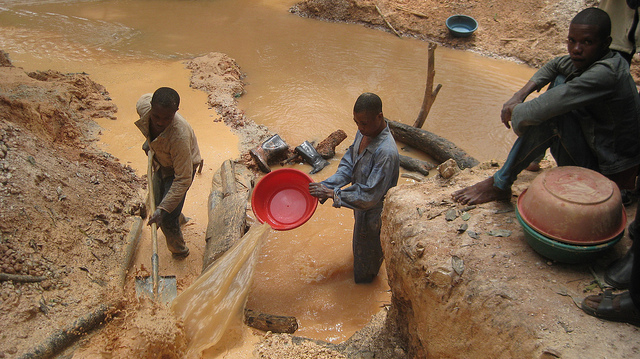Gorillas, Coltan and Mobile Phones
“When we try to pick out anything by itself, we find it hitched to the rest of the universe.”
(John Muir 1838 – 1914)
The first spark that ignited the idea for Gorilla Dawn was from an article that declared in big bold letters, your mobile phone is killing gorillas. It stopped me in my tracks.
Our mobile phones connect us to the world. We can reach family and friends at the touch of a button. We can access live sports coverage and news as it happens. We would be lost without the familiar feel of our phone in our hand.
But our mobile phones connect us to the world in a more sinister way too. Their manufacture leaves a bloody trail of human and animal suffering. Coltan is needed in the production of nearly every electronic device we use. The mining of coltan is threatening the lives of people and gorillas in central Africa.
Bandi Mbubi, inspirational speaker and founder of Congo Calling, campaigns for fair trade conflict-free minerals. Technology has caused the problem, but technology also offers an answer. It gives us all a voice. We are used to demanding fair-trade coffee and dolphin-friendly tuna. Well now it’s time to use consumer power to demand conflict-free minerals. It’s time to petition MPs to push governments to pass laws to ensure fair trade. People like Bandi Mbubi are striving to find a peaceful way forward in a turbulent world.
I met Bandi Mbubi to find out more…
What is coltan?

Coltan is a dull grey mineral ore, from which the mineral tantalum is extracted. Tantalum is used in the manufacture of capacitors, devices that store and control the flow of electric current. Tantalum capacitors are heat resistant and are able to keep electronic devices cooler, safer and more efficient. Because tantalum capacitors are much smaller than capacitors made from other minerals, they are used in small devices such as mobile phones, gaming consoles, laptops and many other electronics.
Where is it found?
Coltan can be found worldwide. It is mined in Africa, Australia, Canada and Brazil.
It is estimated that the Democratic Republic of Congo in Africa has the world’s largest coltan deposits. Some of the highest concentrations of minerals are found in the north east of the country in the national parks, such as the Kahuzi Beiga National Park, in the forest home of the eastern lowland gorilla.
Is tantalum the only mineral mined in the Democratic Republic of Congo?
No. Other mined minerals, including tungsten, tin and gold, are also needed in the manufacture of electronic goods.
How is coltan mined in the Democratic Republic of Congo?

The mines are open-pit, artisanal mines worked with spade and shovel. Men, women and children work in the mines, digging out the coltan, then washing and separating it from the mud. Once extracted, the raw ore is transported by land and air through neighboring countries, mainly Rwanda and Uganda. It eventually reaches East Asia, where smelting companies refine the ore into tantalum, tin, tungsten, and gold. At this point it becomes very difficult to trace the source of these metals. They are sold on the open market, where multinational electronics companies buy huge quantities for use in computers, game consoles, mobile phones, and other devices that are sold all over the world.
Who controls the mines?
Political unrest has allowed some mines to be controlled by armed groups (militia). Miners earn a pittance each day. The militias impose heavy illegal taxes upon those working in the mines and selling coltan, thus funding more violence.
What effect does coltan mining have on people?
Armed groups that control the mines intimidate and terrorise communities, driving people from their land. Food is scarce because farmers and fishermen have been forced from their traditional work to dig for coltan. People often have no choice but to work in the mines. The work is hard and dangerous. Soil erosion can cause landslip and lead to the loss of life. There is no medical aid for people or schooling for children. People live in fear as a result of the ongoing fighting. More than five million people have died since the late 1990s as a result of the violence.
What affect does coltan mining have on the environment?
Many of the mines are located in and around national parks. The open cast mines are poorly regulated. Forests are cleared to gain access to the minerals. Trees are cut down for the building of huts and production of charcoal for cooking fuel. The mining activities pollute waterways, killing fish and causing sickness in animals and people. Deforestation leads to soil erosion, leaving the land unworkable for agricultural use.
What effect does coltan mining have on gorillas?

The numbers of eastern lowland gorillas are in steady decline. Loss of habitat is the primary cause of their demise. In 2002 the United Nations Environment Programme estimated that 10% of gorilla habitat in the Greater Congo Basin would remain by 2032. However, recent research indicates that this is optimistic. Gorillas could disappear from their current range before that time.
Because of the fighting, many areas in the national parks are inaccessible to wildlife rangers, leaving the gorillas without protection. With more people involved in mining activities within the forests, the need for food and a protein source increases. Gorillas are among many animals hunted for bushmeat. The closer contact between gorillas and humans also facilitates the spread of diseases
What affect does coltan mining have on the rest of the world?
The tropical rainforest ecosystems drive our weather systems and play a vital role in carbon sequestration and climate regulation. They are essential to all life on earth. Their loss will have ramifications far across the globe.
What can be done to save the gorillas and the forests?
Only by ensuring peace for people, will we ensure the conservation of the natural world. The United Nations, the Organisation for Economic Co-operation and Development, and other international organisations have also published a great deal of useful research and guidance for companies and consumers seeking responsible supply chains for minerals from Congo and other conflict-affected regions.
In the United States, the Dodd–Frank Act of 2010 contains language that requires electronics companies to verify and disclose the sources of minerals used in their products. In particular, the law requires supply-chain traceability audits by independent third parties, and it requires companies to report the results of these audits to the public and to the Securities and Exchange Commission.
In May 2015, in an unprecedented move, the members of the European Parliament voted on a law that could go a long way in making sure that our mobile phones do not contribute to the war in the DRC. The law would require mandatory compliance for all European companies sourcing their materials in conflict areas such as Congo. This means that some 880 000 European companies that use tin, tungsten, tantalum and gold in the manufacturing of electronic consumer products like mobile phones, will now be obliged to provide information on the steps they take to make sure that their supply chains are free of conflict minerals that are responsible for the violence in the DRC.
But our work is not over. The EU Parliament will start negotiating in the autumn with the European Commission and member states on how this proposal will become law. The final step is approval from the European Council. We still have work to do to ensure that all minerals coming into the EU are sourced responsibly.
The problems in the Congo are complex, and creating stronger and more accountable government institutions is absolutely critical. But taking steps to ensure that the Congo’s minerals do not fuel corruption and abuses is also important, and can put pressure on the government to get its house in order.
What can I do?
1) Recycle mobile phones to ensure some of the minerals are reused.
2) Recruit supporters. Talk about the connection between electronic equipment and gorillas to your friends and family. Give a talk to your school. Write to your MP and MEP about your concerns. (Have link to template letter to MP)
3) Refuse to accept products from electronic companies that do not make real efforts to responsibly source their raw materials. Use your consumer power. Write to electronics companies about your concerns and consequent decisions about purchasing their products. (Have link to list of electronic companies and ratings etc)